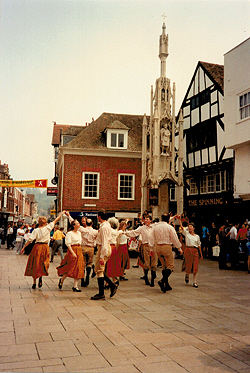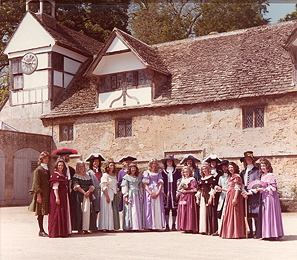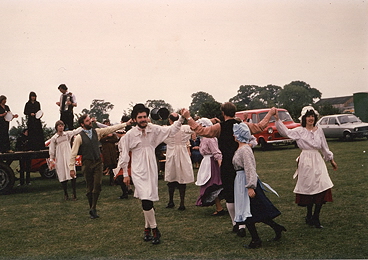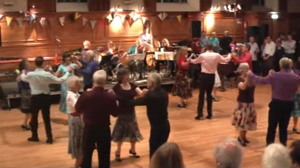 Display Dance
Display Dance

In addition to hundreds of Folk Dance Clubs around Britain, there are a number of Display Teams (known as Performance Groups in the USA and Demo Teams in RSCDS). I'm not talking here about Morris, Rapper, Longsword or Molly sides — these are specifically display dances and are covered elsewhere. I mean teams which display English Country Dancing (often with the addition of other dance forms) to an audience.
Our dancing isn't designed with display in mind — it's done for the enjoyment of the participants rather than to entertain or impress an audience — so the dances are often “souped-up” a little, and several can be glued together into a sequence or suite of dances, often varying the formation and rhythm from dance to dance. In my view this is fine so long as the original dances are still discernible. If a dancer in the audience can say “It's an eight-couple version of Cumberland Square Eight” or “It's a six-couple version of Dorset Four-hand Reel” I'd be much happier than if they said “It's an impressive piece of choreography but I don't recognise any of it”! If you're in a Display Team and looking for ideas, I'm sure you can work out how to do the double Cumberland Square Eight — two couples on each side, the heads working with their opposite head couple for the stars and baskets, sides the same. For other suggestions of adapting traditional dances for display, have a look at Dorset Twelve-Hand Reel and Nottingham Swing Sicilian.
Often however there are no dancers in the audience: the team may perform at a village fête or a twinning association event where the audience knows nothing of Folk Dancing. In this case a sequence of three complicated Playford dances may be totally wasted on them — most people won't even realise that they are three different dances — whereas a simple energetic traditional dance may go down really well. Teams are often quite nervous at the thought of appearing at a Folk Festival, where experienced dancers may be judging their performance and noticing all the little mistakes. Even at a local event you may not be safe! I once went along to an entertainment in a little village hall with music by Wild Thyme and dancing by a display team run by a member of the Jovial Beggars who had pinched a lot of our ideas — and the dancers weren't very good. I was in the second row of the audience, and sitting in front of me was Wendy Crouch. We weren't there to criticise the dancers, we were there because we were both great fans of Wild Thyme, but we probably made the dancers quite nervous. I remember there was a very odd move in one of the dances: I leaned forward and said to Wendy, “Do you do it like that?” “No I don't!” she said emphatically.


Here's my old team, the
Jovial Beggars, based in Harlow and run by Walt Tingle. We had a really good arrangement. You can see the gentry in the first image (led by Walt) who would do a high-class Playford sequence, and then the Rustics in the second (led by me) would burst on and do something wild and energetic — that's me with the waistcoat and beard. The audience loved the variety, and it meant that each group had a chance to rest and decide what to perform next while the other group was on. We even had different music — a recorder consort for the Gentry and an accordionist for the Rustics. The two groups would get together at the end of the display to do our name dance — “The Jovial Beggars” from the
Maggot Pie collection — but in two very different styles! There was plenty of repartee between the two groups, and between the dancers and the audience, and I think that's really important, A lot of teams would just walk on, perform a sequence of dances, and walk off again. We were very much aware that we were entertainers — our unspoken motto was “We may not be perfect, but by God we're jovial”! We were also a democratic team — everyone could have their say about a particular sequence, and eventually Walt would say, “All right, I've listened to the arguments: here's what we're going to do” — and everyone would accept it. (See and hear some
Reminiscences of Walt). I remember once at Broadstairs Folk Week we were booked to do displays and so were
Contra from the Birmingham area. There were two sequences that we were performing together, one choreographed by us and one by them. A soon as their choreographer explained the sequence, some of the JBs started saying, “Why don't we do so-and-so?” while the members of Contra looked on in shocked silence — you didn't argue with the person in charge!

EFDSS had its own Display Team,
London Folk, for many years. In particular they performed at the Albert Hall Festival each year — a real show-case for the Society. But times change, the falling audience figures meant that the Albert Hall Festival was abolished, and London Folk is no more, though the team came together again in 2011 to dance at Cecil Sharp House — click the image for a really great example of how English dancing should be done!
Some would argue that if you want to dance well, with other people who are committed to dancing well, the best thing to do is join a Display Team. I'd say this isn't necessarily true, but it's certainly worth a try!
There's a fascinating talk by Roy Dommet about the history of Morris Dancing archived at web.archive.org/web/20250811180257/http://www.opread.force9.co.uk/RoyDommet/Others/sidmouth94lect.htm
Close

Click here if there's no picture.
 Display Dance
Display Dance



